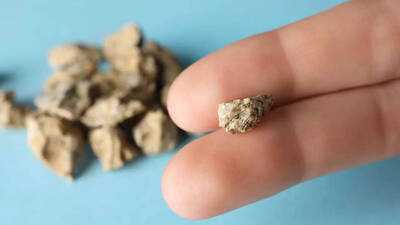High uric acid occurs when the body produces too much uric acid or fails to eliminate it properly. This buildup can lead to various health problems, including joint pain, inflammation, and kidney issues. High uric acid is often linked to conditions like gout, kidney disease, obesity, and diabetes. It may also be associated with high blood pressure, heart disease, and metabolic syndrome. Factors such as poor diet, dehydration, and certain medications can worsen uric acid levels. Managing high uric acid through lifestyle changes and medical care is important to reduce the risk of complications and improve overall health.
Diseases that leads to high uric acid: From kidney diseases to diabetes and more
1. Gout: A painful type of arthritis

Gout is one of the most well-known conditions linked to high uric acid. It causes sudden, severe attacks of joint pain, redness, and swelling, often in the big toe. When uric acid crystals accumulate in the joints, they trigger inflammation and intense discomfort.
Key symptoms: Intense joint pain, redness, swelling, especially in the feet and hands.
2. Kidney disease: Impaired uric acid removal

The kidneys play a vital role in removing uric acid from the body. When kidney function declines due to chronic kidney disease or other disorders, uric acid builds up in the blood. This can worsen kidney health and contribute to other complications.
3. Obesity: A major risk factor

Excess body weight increases uric acid production and decreases kidney clearance. People with obesity are at higher risk of developing hyperuricemia and related complications like gout.
4. Diabetes: Linked to elevated uric acid

People with type 2 diabetes often have higher uric acid levels due to insulin resistance affecting kidney function. This increases the risk of gout and kidney damage.
5. High blood pressure (Hypertension)

Hypertension can impair kidney function, leading to reduced uric acid excretion and higher blood levels. High uric acid is also linked to worsening blood pressure control.
6. Heart disease and cardiovascular risks

Elevated uric acid is associated with increased risk of heart disease, including heart attacks and strokes. It may contribute to inflammation and damage in blood vessels.
7. Kidney stones

High uric acid levels can lead to the formation of uric acid kidney stones, causing severe pain and urinary problems.
8. Metabolic syndrome: A cluster of risks
Metabolic syndrome includes conditions like high blood pressure, high blood sugar, excess body fat, and abnormal cholesterol. These collectively increase the risk of high uric acid and gout.
9. Hypothyroidism: Low thyroid function
An underactive thyroid gland can slow down metabolism and reduce kidney function, leading to higher uric acid levels.
10. Psoriasis: Skin condition linked to uric acid
Psoriasis, a chronic skin condition, is also linked to increased uric acid levels, possibly due to increased cell turnover and inflammation.
Lifestyle changes to prevent high uric acid
Also read | Why nasal infections increase during the monsoon season: Know its symptoms and ways to prevent
Diseases that leads to high uric acid: From kidney diseases to diabetes and more
1. Gout: A painful type of arthritis

Gout is one of the most well-known conditions linked to high uric acid. It causes sudden, severe attacks of joint pain, redness, and swelling, often in the big toe. When uric acid crystals accumulate in the joints, they trigger inflammation and intense discomfort.
Key symptoms: Intense joint pain, redness, swelling, especially in the feet and hands.
2. Kidney disease: Impaired uric acid removal
The kidneys play a vital role in removing uric acid from the body. When kidney function declines due to chronic kidney disease or other disorders, uric acid builds up in the blood. This can worsen kidney health and contribute to other complications.
3. Obesity: A major risk factor
Excess body weight increases uric acid production and decreases kidney clearance. People with obesity are at higher risk of developing hyperuricemia and related complications like gout.
4. Diabetes: Linked to elevated uric acid
People with type 2 diabetes often have higher uric acid levels due to insulin resistance affecting kidney function. This increases the risk of gout and kidney damage.
5. High blood pressure (Hypertension)

Hypertension can impair kidney function, leading to reduced uric acid excretion and higher blood levels. High uric acid is also linked to worsening blood pressure control.
6. Heart disease and cardiovascular risks
Elevated uric acid is associated with increased risk of heart disease, including heart attacks and strokes. It may contribute to inflammation and damage in blood vessels.
7. Kidney stones
High uric acid levels can lead to the formation of uric acid kidney stones, causing severe pain and urinary problems.
8. Metabolic syndrome: A cluster of risks
Metabolic syndrome includes conditions like high blood pressure, high blood sugar, excess body fat, and abnormal cholesterol. These collectively increase the risk of high uric acid and gout.
9. Hypothyroidism: Low thyroid function
An underactive thyroid gland can slow down metabolism and reduce kidney function, leading to higher uric acid levels.
10. Psoriasis: Skin condition linked to uric acid
Psoriasis, a chronic skin condition, is also linked to increased uric acid levels, possibly due to increased cell turnover and inflammation.
Lifestyle changes to prevent high uric acid
- Get regular check-ups: Regular health check-ups can help identify high uric acid levels and underlying health conditions.
- Manage underlying conditions: If you have underlying conditions like diabetes, hypertension, or kidney disease, work with your healthcare provider to manage them effectively.
- Maintain a healthy weight: Excess weight can increase the risk of developing high uric acid levels and gout.
- Exercise regularly: Regular physical activity can help reduce uric acid levels and improve overall health.
- Limit alcohol consumption: Avoid or limit alcohol consumption, especially beer and liquor, which can raise uric acid levels.
- Manage stress: Stress can trigger gout attacks and increase uric acid levels. Practice stress-reducing techniques like meditation or yoga.
Also read | Why nasal infections increase during the monsoon season: Know its symptoms and ways to prevent
You may also like

Lucas Paqueta CLEARED by The FA after two-year investigation and escapes lifetime ban

Bridezilla asks friend to shave dog before wedding and people aren't happy

Perishers - 31st July 2025

Santander offers bumper 6% interest savings account with cashback on bills

Plane taking jockeys to Goodwood makes emergency landing - 'Thank God we're in one piece'






